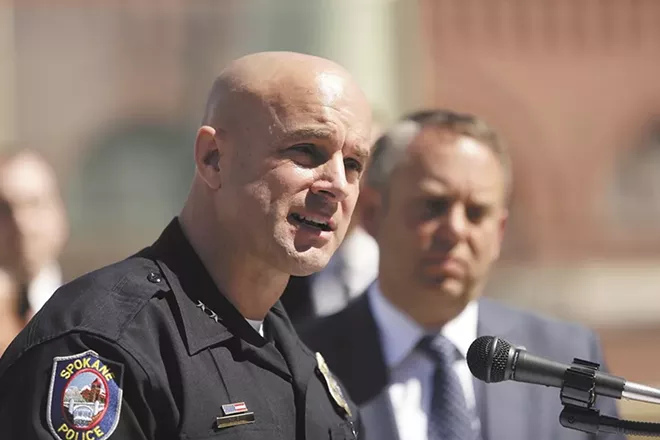In a Jan. 25 email titled "
The email is indicative of the currently frayed relationship between the OPO and Spokane Police Chief Craig Meidl. Since last summer, the ombudsman has clashed with the Police Department over a variety of oversight issues. Now, tensions are ratcheting up further. The OPO Commission is working with an attorney to possibly litigate the issues. Meanwhile, Logue, his staff and members of the OPO Commission have been banned from the Police Advisory Committee at Meidl's request due to the disputes — eliciting allegations of retaliation.
Last month, Joan Butler, the chair of the Police Advisory Committee, informed Logue in an email that his office and the OPO Commission have been barred from membership on the committee. (
"I have come to believe that it is a conflict of interest to have members of the Ombudsman's Office and/or commission as members of the Police Advisory Committee," Butler writes. "The Police Advisory Committee's sole purpose is to serve as the sounding board for the chief of police and it is not possible to have thoughtful discussions with the chief when members of the Ombudsman's Office and/or commission are present."
At a Jan. 22 OPO Commission meeting, Ombudsman Logue described their dismissal from the committee as Meidl retaliating against him and the OPO Commission for continually butting heads with SPD. "
I can't take that as anything but retribution. It just feels that way. I have no other way to say it. That's how I take it," he said.
Chief Meidl tells the Inlander that he asked Butler to remove the OPO and the OPO Commission from the committee because he wouldn't be able to have frank discussions with the other members about the ongoing disputes between him and the OPO.
"When the ombudsman is involved in filing complaints and threatening lawsuits, clearly you cannot have an open dialogue," Meidl says. "I need to be in a position where I can talk to my advisers about this. How can I do that when the people threatening complaints are in there?"
"This an advisory [committee] for the chief of police," he adds.
In response to Logue's characterization that the move is retaliation, Meidl says: "It’s not retribution. It’s a conflict of interest and I’m sorry that he sees that as retribution."
This latest scuffle stems from a slew of disagreements between the ombudsman and SPD. Logue has requested that his staff have access to SPD Internal Affairs records while the commission has asked for information on police use-of-force incidents involving people of color. Both requests have been denied by Chief Meidl, who has cited ongoing contract negotiations between the Spokane Police Guild and the city of Spokane (as well as legal advice that he's received). Mayor Condon has also taken the same line, stating in a Dec. 4 letter to the OPO Commission that the issues will be "resolved" in the bargaining process.
Adding fuel to the fire is Meidl's refusal to redo an inquiry into a citizen complaint
With the mayor unwilling to get into the fight, the disputes have effectively been brought to a
former Spokane Mayor Dennis Hession on next steps in potential legal action.
All of this — from the Spokane Police Guild's grievance letter to Chief Meidl's argument that the issues should be addressed in the ongoing contract negotiations — frame Logue's Jan. 25 email rallying the commissioners.
"In light of the continued pushback from the Guild on the OPO and the current pushback on the OPO [Commission] from the Police Chief ... we should not take a back seat and simply trust that proper authorities of the OPO and the OPO [Commission] are being kept in mind," he writes.
In the email, Logue also protests any potential dilution of civilian oversight authorities during the ongoing contract negotiations between the city and the police union.
"We have no idea what the city is bargaining for regarding the OPO and the OPO Commission," he writes. "We should not accept any bargained contract that is outside of the City
This post has been updated to correct OPO Commissioner Smith's title and to clarify Chief Meidl's position.























